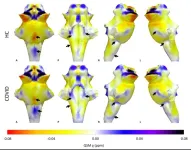(Press-News.org) Damage to the brainstem – the brain’s ‘control centre’ – is behind long-lasting physical and psychiatric effects of severe Covid-19 infection, a study suggests.
Using ultra-high-resolution scanners that can see the living brain in fine detail, researchers from the Universities of Cambridge and Oxford were able to observe the damaging effects Covid-19 can have on the brain.
The study team scanned the brains of 30 people who had been admitted to hospital with severe Covid-19 early in the pandemic, before vaccines were available. The researchers found that Covid-19 infection damages the region of the brainstem associated with breathlessness, fatigue and anxiety.
The powerful MRI scanners used for the study, known as 7-Tesla or 7T scanners, can measure inflammation in the brain. Their results, published in the journal Brain, will help scientists and clinicians understand the long-term effects of Covid-19 on the brain and the rest of the body. Although the study was started before the long-term effects of Covid was recognised, it will help to better understand this condition.
The brainstem, which connects the brain to the spinal cord, is the control centre for many basic life functions and reflexes. Clusters of nerve cells in the brainstem, known as nuclei, are responsible for regulating and processing essential bodily functions such as breathing, heart rate, pain and blood pressure.
“Things happening in and around the brainstem are vital for quality of life, but it had been impossible to scan the inflammation of the brainstem nuclei in living people, because of their tiny size and difficult position.” said first author Dr Catarina Rua, from the Department of Clinical Neurosciences. “Usually, scientists only get a good look at the brainstem during post-mortem examinations.”
“The brainstem is the critical junction box between our conscious selves and what is happening in our bodies,” said Professor James Rowe, also from the Department of Clinical Neurosciences, who co-led the research. “The ability to see and understand how the brainstem changes in response to Covid-19 will help explain and treat the long term effects more effectively.”
In the early days of the Covid-19 pandemic, before effective vaccines were available, post-mortem studies of patients who had died from severe Covid-19 infections showed changes in their brainstems, including inflammation. Many of these changes were thought to result from a post-infection immune response, rather than direct virus invasion of the brain.
“People who were very sick early in the pandemic showed long-lasting brain changes, likely caused by an immune response to the virus. But measuring that immune response is difficult in living people,” said Rowe. “Normal hospital type MRI scanners can’t see inside the brain with the kind of chemical and physical detail we need.”
“But with 7T scanners, we can now measure these details. The active immune cells interfere with the ultra-high magnetic field, so that we’re able to detect how they are behaving,” said Rua. “Cambridge was special because we were able to scan even the sickest and infectious patients, early in the pandemic.”
Many of the patients admitted to hospital early in the pandemic reported fatigue, breathlessness and chest pain as troubling long-lasting symptoms. The researchers hypothesised these symptoms were in part the result of damage to key brainstem nuclei, damage which persists long after Covid-19 infection has passed.
The researchers saw that multiple regions of the brainstem, in particular the medulla oblongata, pons and midbrain, showed abnormalities consistent with a neuroinflammatory response. The abnormalities appeared several weeks after hospital admission, and in regions of the brain responsible for controlling breathing.
“The fact that we see abnormalities in the parts of the brain associated with breathing strongly suggests that long-lasting symptoms are an effect of inflammation in the brainstem following Covid-19 infection,” said Rua. “These effects are over and above the effects of age and gender, and are more pronounced in those who had had severe Covid-19.”
In addition to the physical effects of Covid-19, the 7T scanners provided evidence of some of the psychiatric effects of the disease. The brainstem monitors breathlessness, as well as fatigue and anxiety. “Mental health is intimately connected to brain health, and patients with the most marked immune response also showed higher levels of depression and anxiety,” said Rowe. “Changes in the brainstem caused by Covid-19 infection could also lead to poor mental health outcomes, because of the tight connection between physical and mental health.”
The researchers say the results could aid in the understanding of other conditions associated with inflammation of the brainstem, like MS and dementia. The 7T scanners could also be used to monitor the effectiveness of different treatments for brain diseases.
“This was an incredible collaboration, right at the peak of the pandemic, when testing was very difficult, and I was amazed how well the 7T scanners worked,” said Rua. “I was really impressed with how, in the heat of the moment, the collaboration between lots of different researchers came together so effectively.”
The research was supported in part by the NIHR Cambridge Biomedical Research Centre, the NIHR Oxford Biomedical Research Centre, and the University of Oxford COVID Medical Sciences Division Rapid Response Fund.
END
Ultra-powered MRI scans show damage to brain’s ‘control center’ is behind long-lasting Covid-19 symptoms
2024-10-07
ELSE PRESS RELEASES FROM THIS DATE:
Despite progress, China remains tethered to coal as climate change pressures mount
2024-10-07
A new paper from the University of California San Diego details how China faces numerous political, economic and technological obstacles as it tries to transition away from coal—the country’s primary energy source—while balancing the need to combat climate change with the need for energy security.
Despite its commitment to "phase down" coal, China recently has been permitting and constructing coal plants at rates not seen in a decade.
“There is an increased focus on energy security in China—in 2021, the country experienced its worst power outages in decades, affecting ...
Open Call: Journalists in Residence Program at Institute of Science and Technology Austria (ISTA)
2024-10-07
The Institute of Science and Technology Austria (ISTA) is a PhD-granting research institute near Vienna. It was founded in 2009, with the bold ambition of providing the best possible environment to conduct innovative frontier research. It is dedicated to transcending traditional boundaries of disciplines, cutting-edge infrastructure, training the next generation of scientific leaders, and increasing the impact of science through science engagement as well as technology transfer. It is home to 82 research groups across all fields, ...
Small creatures, big impact
2024-10-07
Could the butterfly effect - in which a small change in one state of a system can result in large differences in a later state - also apply to the earth’s oceans, as well as its skies?
Some species of zooplankton are on the order of one millimeter, but don’t let their size fool you. It’s possible these small creatures can create quite a wave.
While it’s long been understood that large marine animals, like fish or whales, can stir up the ocean’s water columns, the impact ...
Researcher receives grant to enhance quantum machine learning education
2024-10-07
At a time when data are doubling every two years, the U.S. is projected to create over 40 billion gigabytes of data by 2025. To prepare for the influx, Kennesaw State University associate professor Yong Shi, an expert in quantum machine learning (QML), aims to unlock insights from the data surge and educate future QML researchers.
Shi, along with colleagues Dan Lo, professor of computer science, and Luisa Nino, assistant professor of industrial and systems engineering, recently secured a National Science Foundation (NSF) grant to develop open-source, hands-on QML training materials ...
Professor gives American grading system an F
2024-10-07
OXFORD, Miss. – America’s obsession with grades is failing students and jeopardizing the future of education, a University of Mississippi professor argues in his new book.
Josh Eyler, director of the Center for Excellence in Teaching and Learning, recently released “Failing Our Future: How Grades Harm Students, and What We Can Do About It” (Johns Hopkins University Press), in which he argues that the traditional system of grading is harmful to students.
“This book looks at the issues with grades in learning, the kinds of Issues grades ...
NIH awards $2.2 million to UMass Amherst to explore new tuberculosis therapies
2024-10-07
AMHERST, Mass. – The National Institutes of Health recently awarded $2.2 million to Alissa Rothchild, assistant professor in the Department of Veterinary and Animal Sciences at the University of Massachusetts Amherst and an expert in tuberculosis (TB) immunology, to study the very first cells that respond to Mycobacterium tuberculosis (Mtb), the bacteria causing TB.
How those initial cells, known as alveolar macrophages, or AMs, respond to the bacteria is not entirely known, though Rothchild and her lab have shown in a previous study that AMs don’t respond to Mtb infection the way other macrophages do. Instead of mounting a strong inflammatory response, AMs turn on a cell-protective ...
Immune-based treatment gets a boost to its cancer-fighting superpowers
2024-10-07
Imagine a world where your own immune cells are transformed into cancer-fighting superheroes. This is the promise of CAR-T cell therapy, a groundbreaking treatment that’s already saving lives.
In this therapy, patients’ own immune cells are collected, genetically engineered so that they specifically target cancer cells, then returned to the body. The result is a potent new option for battling blood cancers. However, as with any superhero journey, the process of harnessing this incredible power comes with ...
First report of its kind describes HIV reservoir landscape in breast milk
2024-10-07
Embargoed for release until 5:00 p.m. ET on Monday 7 October 2024
@Annalsofim
Below please find summaries of new articles that will be published in the next issue of Annals of Internal Medicine. The summaries are not intended to substitute for the full articles as a source of information. This information is under strict embargo and by taking it into possession, media representatives are committing to the terms of the embargo not only on their own behalf, but also on behalf of the organization they represent.
----------------------------
1. First ...
Penn Nursing study finds link between nurse work environment quality and COVID-19 mortality disparities
2024-10-07
PHILADELPHIA (October 7, 2024) – A new Penn Nursing Center for Health Outcomes and Policy Research (CHOPR) study – published in INQUIRY – has found a strong association between the quality of the nurse work environment and COVID-19 mortality rates among socially vulnerable Medicare beneficiaries. The study examined data from 238 acute care hospitals across New York and Illinois.
The researchers found that patients from socially vulnerable communities, including those facing higher levels of poverty, housing insecurity, and limited transportation, were more likely to die from COVID-19 if they were ...
Systematic review highlights decline in mental health care and increase in suicides following FDA youth antidepressant warnings
2024-10-07
Key Takeaways:
A new systematic review led by the Harvard Pilgrim Health Care Institute examined a wide body of evidence documenting pediatric mental health outcomes in the period following FDA Black-Box Warnings that antidepressants may be associated with suicidal thoughts and behaviors among youth.
The data indicate that these warnings, meant to increase monitoring of suicidal thoughts and behaviors, resulted in reduced essential medication use and mental health treatment of pediatric depression and increased suicide attempts and deaths.
The findings support a re-evaluation of the Black-Box ...





